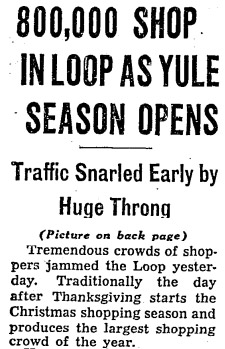I've seen a few people ask when the day after Thanskgiving became such a gapers block of shopping: Black Friday. Generally these sorts of things get blamed on current generations, like most things consumptive. I blame the notoriously shallow people that were my grandparents' generation, aka the "Greatest" generation.
Oddly enough, it began, in part, with some sympathy towards labor. In 1906 the Tribune began a push to begin Christmas shopping earlier in the season, to the benefit of the shopper and the shopgirl:

(Since then the editorial board has given up this enlightened capitalism. Here's their editorial board on Wednesday, wishing low-paid retail workers a crappy Thanksgiving while encouraging shoppers to make the Black Friday push even more chaotic: " For those who don't like being required to sacrifice their own holiday to ring up those purchases, round up the shopping carts or stock the shelves for those hypercompetitive overconsumers, well, you knew the job was dangerous when you took it." Black Friday has finally come full circle, becoming what it was supposed to prevent.)
Here's the Trib in 1908, looking into how the State Street stores handle the massive Christmas rush:

Already we've got "early shopping," but it's only moved back to December 1. By 1911, things are getting closer.

It took awhile, but by 1924 early shopping was starting to change the bottom line:

Oddly enough, things really began to pop off the day after Thanksgiving during the Depression. From 1931:

No, for real:

By 1939, changing the day of Thanksgiving to the next-to-last Thursday in November was seen as a way to advance the nation's economic security:

This was something of a political hot potato for a couple years, before Congress settled on the fourth-Thursday compromise.
By the time the Greatest Generation had come home from the War and begun to fully enjoy its antebellum prosperity in 1954, Black Friday, long before it had taken the name, had become "tradition."

Why has the media encouraged this shopping holiday for a century? Look no further than your doorstep, assuming a print paper still lands on yours. From Thanksgiving Day, 1956:



